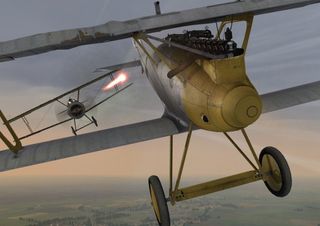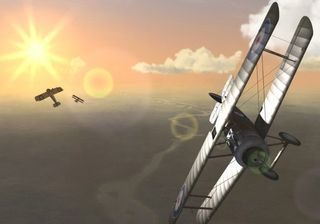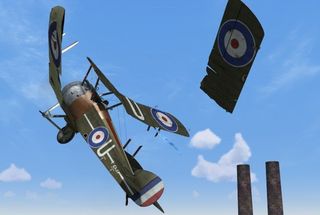
For the last 30 years, sim developers have been slogging their guts out furnishing us with vehicles that live and breathe... machines that leak oily history into the tin drip trays of our lives. They've given us realism by the shedload and what have we given them in return? Apart from money, obviously.
I'm hull-down in a Steel Fury sunken lane when a thought hits me like a speeding Panzerschreck rocket: for most of my gaming career I've sought out super-realistic digital steeds, then proceeded to use those steeds in a manner that, while not exactly reckless, was hardly honest – hardly reflective of the person I suspect myself to be. What if, just for a change, I repaid a sim's gift of authenticity with some authenticity of my own?
WWI aerial combat explorer Rise of Flight is one of those games that's forever winking at me from the shelf. Since I last surrendered to its charms, it's gone free-to-play and been bolstered by a circus of payware aircraft and a staffel of substantial patches. I'm rustier than those heaps of mud-encrusted munitions you see in the corners of Flanders fields, yet eager to return. This visit will be different though. No ego-massaging compromises this time, no sly, death-cheating restarts or out-of-character glory hunting. What follows is what happens when a person who's uncommonly fond of life roleplays a Great War pilot who's uncommonly fond of life. This, gentle reader, is the story of a coward in a Camel.

November 10, 2012
In for a penny, in for a pound. If I'm going to do the permadeath, full-realism thing I may as well do it in a machine as famous for its bad habits as its good ones. Four hundred and thirteen Allied pilots lost their lives flying Sopwith Camels in combat during WWI. A further 385 perished in accidents. Choosing Biggles' and Snoopy's favourite cloud chariot in a RoF campaign means I get to join the war in mid-1917, a time when the German Air Force was on the back foot and the armistice was 'only' 17 months away. Less encouragingly, it also means I'm pinning my survival hopes on a bus that, knowing RoF's impeccable physics, will attempt to murder me on a regular basis. Without careful preparation, this sim memoir, and my fledgling career in the RFC, may not last the page.
I spend my first morning swotting hard. The Camel was a notorious trainee slayer, and I'm determined not to end up its next victim. Many greenhorns, and (gulp) a good few veterans too, seem to have been caught out by its sensitive-yet-powerful rotary engine and tail-heavy flight posture. With no interactive instructor or squadron oracle to quiz, I find myself Googling 'RoF Camel tutorials'. Moments later, I'm introduced to Requiem10NS, an Australian with a remarkable way with sim biplanes and wonderful knack for crisp communication. I pay particular attention to his spin recovery tips.

November 11
The biggest gaming news, reviews and hardware deals
Keep up to date with the most important stories and the best deals, as picked by the PC Gamer team.
There's no point putting it off any longer. Joystick connected and configured, desk draped with sheets of scribbled notes, I nervously place my simulated buttocks in the simulated wicker seat of a RoF Camel for the very first time. Throttle closed? Check. Fuel mixture lever to full-rich? Check. Here we go. The 130hp Clerget engine clears its throat then starts burbling like a bee trapped in a foxglove. The mahogany prop just beyond the muzzles of my twin Vickers MGs becomes a blur. Everywhere, wood and canvas vibrates impatiently. After a few moments of engine warming, I give... Catherine... Candice... Camilla the Camel a bit of gas and we begin to trundle forwards.
And leftwards and rightwards. A light crosswind and the gyroscopic effects of that spinning motor make for a drunken comedy of a take-off. The important thing is, we're airborne. Now what?
I gingerly toy with the mixture lever, observing how its position influences revs at different throttle settings. Rambling over untended Artoisian farmland I risk a few gentle dives and climbs. A British artillery battery finds itself the target of a mock strafing run, then the time comes for the first real test. Come on Camilla, let's get you back on the ground.
Windsock inspected, I line up and begin blipping the throttle to bleed speed. The row of deserted hangars and tents see-saws then settles. Things are looking just dandy until France and flying-machine actually meet. That's when the sickening bounces begin, followed by the dipping of the starboard wingtip. Before I know it, Camilla's tail is 18 feet above her nose, and her shattered prop is pawing the turf. We're down and I appear to be unhurt, but the fitters have a got a bally long night of repair work ahead of them.
Most Popular

